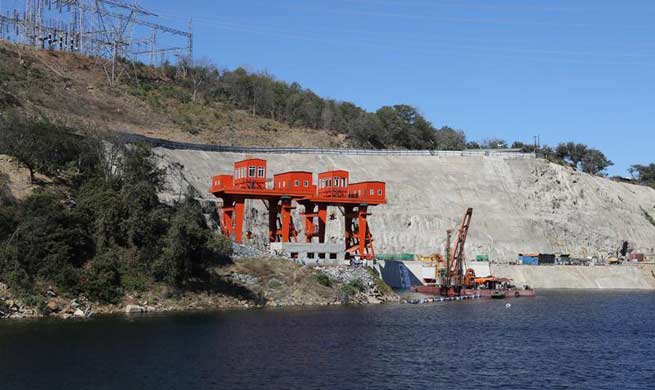BEIJING, June 5 (Xinhua) -- Responding to climate change, one of the biggest challenges facing the world today, requires not only ambitious initiatives, but also, more significantly, exertion of concerted efforts by the entire international community.
More frequent forest fires, accelerated sea level rise, increased coastal flooding and longer, more intense heat waves... All of these risks are waking peoples and governments up to the fact that global warming has become a fundamental threat to the economies and the well-being of countries worldwide.
In recognition of this, over 100 countries spent two weeks in Paris in December 2015, hammering out the final wording of a historic climate accord, which involves a unified and worldwide effort to reduce greenhouse gas emissions and mitigate the effects of global warming from 2020.
But to the regret of almost all, U.S. President Donald Trump on Thursday announced that his country would withdraw from the Paris climate deal, which is regarded by many as the "best chance we have to save the planet."
Trump's decision has met with strong opposition, not only on the global stage, but also within his own country. In political observers' eyes, the announcement does not come as a surprise.
Calling climate change a hoax during his election campaign, Trump vowed to cede the Paris deal and rescind various climate policies by the Obama administration so as to revive the flagging coal industry and create more jobs in the U.S. heartland.
Clearly, while making the decision to pull out from the pact to fulfill his campaign promises, what the president bore in mind is the country's internal politics and short-term economic gains, instead of a bigger picture of the world's long-term welfare and interests.
Actually, it is the United States' bounden duty to promote the global efforts in dealing with climate change and protecting the environment as it is historically responsible for more emissions than any other country.
As David G. Victor, a longtime scholar of climate politics at the University of California, San diego, has pointed out, "In cumulative terms, we (the United States) certainly own this problem (climate change) more than anyone else does."
This, in many people's view, obligates the United States to take concrete and ambitious action to slow global warming. And this has also explained why Trump's decision was widely thought to be a momentous setback, in both practical and political terms, for the global efforts to address climate change.
But beyond the emotions and the shock caused by his decision, the U.S. withdrawal would not call into question the worldwide dynamic established in the fight against climate change, as the general trend and momentum is not reversible.
Since the Paris climate accord was signed in 2015, more than 190 nations have signed the deal, with 146 of those countries having already ratified it.
Many other major players on this issue including the European Union, China and India have reiterated their willingness to step up efforts.
Even in the United States, many state and municipal governments and enterprises have said that they will continue their drive to reduce greenhouse gas emission despite their president's decision.
In today's world, countries and enterprises have woken up to the fact that it is in their own interest to cut their carbon pollution. They have realized that far from destroying the economy, domestic climate action produces real benefits in terms of job creation, poverty reduction and pollution control. And as the impacts of global warming have been felt around the world, they have seen concretely that not addressing climate change will have real and lasting negative consequences.
Climate change is a global challenge, from which no country can stand aloof. The Paris agreement is a hard-won result which represents the broadest consensus and strong political will of the international community, and sets a target for the global campaign against climate change.
Countries worldwide, big or small, rich or poor, need to work together on climate change so as to build a better world for future generations. The United States, instead of just walking away from the climate deal, needs to join in the concerted efforts for its own interests as well as for the long-term benefits of the entire world.
















